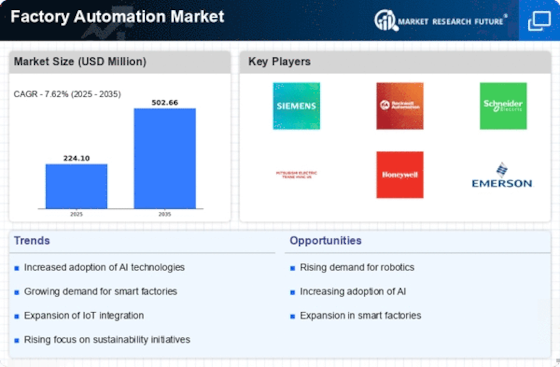Top Industry Leaders in the Factory Automation Market

The Competitive Landscape of the Factory Automation Market
The factory automation market, pulsates as the heart of modern manufacturing. Within its steel and silicon arteries, robots dance, machines whisper calculations, and products emerge meticulously sculpted. Navigating this complex ecosystem requires a clear understanding of the strategies, factors, and players shaping its competitive terrain. Navigating this dynamic landscape requires a clear understanding of the strategies, factors, and players shaping the competitive terrain.
Some of the Factory Automation companies listed below:
- ABB
- Emerson Electric Co.
- Mitsubishi Electric Corporation
- General Electric
- Rockwell Automation, Inc.
- Omron Corporation
- Honeywell International Inc.
- Schneider Electric SE
- Siemens AG
- Yokogawa Electric
Strategies Adopted by Leaders
- Technological Prowess: Leading players like Siemens, ABB, and Rockwell Automation invest heavily in R&D, pushing boundaries in robotics, industrial IoT (IIoT), and artificial intelligence (AI). They pioneer technologies like collaborative robots, edge computing solutions, and AI-powered predictive maintenance, offering enhanced efficiency, flexibility, and uptime.
- Application Focus: Specialization is key. Mitsubishi Electric excels in automation solutions for the automotive industry, while FANUC dominates machine tool programming and controls. This tailoring allows for deep domain expertise and solutions adapted to specific industry challenges.
- Integrated Automation Suites: Offering comprehensive packages encompassing hardware, software, and services creates a one-stop shop for manufacturers. Companies like Schneider Electric and Honeywell provide holistic automation solutions, simplifying implementation and fostering long-term customer relationships.
- Global Footprint: Establishing geographically diverse sales and service networks is crucial for catering to the global nature of manufacturing. Omron and Bosch maintain strong regional presence across continents, ensuring customer proximity and efficient support.
- Strategic Partnerships: Collaborations with sensor manufacturers, software vendors, and system integrators accelerate innovation and broaden market reach. For instance, partnerships between automation providers and industrial data analytics companies enable seamless integration of IIoT solutions for real-time insights.
Factors for Market Share Analysis:
- Automation Level: Analyzing market share by automation level (basic, partial, full) reveals dominant players in each segment and future growth potential. While basic automation remains prevalent, demand for higher automation levels and integrated systems is increasing.
- Industry Segment: Understanding the needs of different end-user segments (automotive, electronics, food and beverage) is key. Automotive automation prioritizes precision and speed, while food and beverage applications demand stringent hygiene and safety standards.
- Robot Type: Analyzing market share by robot type (industrial, collaborative, service) helps identify leaders in each segment and future trends. Industrial robots remain the mainstay, but collaborative robots are gaining traction due to their ease of integration and human interaction capabilities.
New and Emerging Companies:
- Universal Robots: This Danish company specializes in collaborative robots (cobots) designed for ease of use and human interaction, catering to the growing demand for flexible and adaptable automation solutions.
- Yaskawa Motoman: This Japanese company pioneers human-robot collaboration technologies, ensuring safe and efficient interaction between humans and robots in the factory environment.
- Geek+: This Chinese company focuses on autonomous mobile robots (AMRs) for material handling and logistics within factories, offering automated and intelligent solutions for increased efficiency and flexibility.
Industry Developments:
Senior executives at Okuma America Corp., a leading manufacturer of computer numeric control (CNC) machine tools, controls, and automation systems, announce the establishment of a new business segment in 2023. This segment will be responsible for promoting, marketing, and providing customer service for manufacturing production line systems that use Okuma CNC machine tools and integrated automation technologies. The new division, which is situated at the Okuma America Corp. headquarters in Charlotte, North Carolina, started operations on April 3, 2023.
The industrial automation industry will be the focus of a newly created product line that will be unveiled by global engineering technology business Renishaw in 2023. The new RCS product line intends to revolutionise the commissioning and maintenance of industrial automation technology by building on its existing experience and technologies for industrial metrology applications.
To assist in the transformation of some of Australia's largest businesses and make them smarter, safer, cleaner, more productive, and more secure, Telstra announced a new end-to-end Industrial Automation capabilities in 2023.









